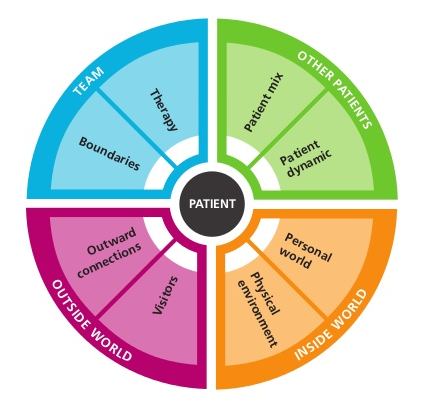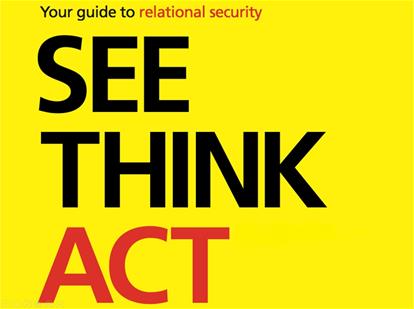Therapeutic and relational security is a best-in-class approach to safety at secure, high-risk health care facilities. The specialized program is in use at the Forensic Psychiatric Hospital and Red Fish Healing Centre.

Therapeutic and relational security aligns with current research and best practices in
trauma-informed practice. Trauma is often closely tied to substance use, mental illness, stigma, health care access barriers, and other challenges. Trauma-informed practice means recognizing this link and making sure that people feel safe and are not re-traumatized or triggered by their care. When people feel safe, they are far less likely to behave aggressively.
Psychosis and schizophrenia are common among our patients and clients. Often, they live with a combination of more than one severe mental illness. This makes them more likely than most people to behave aggressively.
Another factor is a substance use disorder, which often accompanies severe mental illness. The links between alcohol use, drug use, and aggression are well-documented.
History of trauma
Many forensic patients are victims of abuse, neglect and other trauma, and any number of things in a forensic hospital setting might trigger or re-traumatize a patient — particularly when they have had poor experiences with the health-care system, as is often the case with patients who are severely mentally ill.
Therapeutic and relational security aims to help health care professionals prevent client and patient aggression rather than react to it by focusing on the connection and interplay between patient care and safety, including what might cause a patient to behave aggressively. Staff and physicians who have a thorough understanding of a patient, their triggers, and how they relate to others will often be able to stop violent incidents before they happen.
The approach focuses on four dimensions of a patient's environment:
- The care team
- Other patients
- The patient's inner world
- The patient's outer world
Therapeutic and relational security is designed to be used in combination with other kinds of security. Different team members are responsible for these three distinct but related aspects of security:
-
Therapeutic and relational security
-
Procedural security, or the policies, procedures, and staff training designed to maintain safety and security
-
Physical security, including fences, locks, personal alarms, secure rooms and other infrastructure that keeps people safe
All three approaches are necessary at all times. One approach should never substantially compensate for the absence or ineffectiveness of another.
Therapeutic and relational security originated in the United Kingdom. It is based on a curriculum suite called See Think Act, which is endorsed by the
Royal College of Psychiatrists. Learn more about the
origins of therapeutic and relational security in this story.

Putting the patient at the centre of care is integral to our approach at BC Mental Health and Substance Use Services. By using therapeutic and relational security, we are improving safety for our patients, staff and physicians while also taking a more holistic approach to patient care by recognizing what they have experienced and what they need to feel safe. We'll be rolling it out across our other programs in the future.
Contact us to learn more about therapeutic and relational security at BC Mental Health and Substance Use Services, including resources available to mental health professionals. We are available for consultations if you are interested in implementing therapeutic and relational security in your own health care setting.
